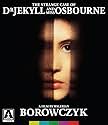Marina Pierro
- Actress
- Director
- Writer
Marina Pierro is an Italian actress, director, and writer. She was raised in Boscotrecase, near Naples, and later moved to Turin, where she studied art and design. Her early interest in painting and sculpture would later influence the visual style of her creative work, particularly in her collaborations with avant-garde filmmakers.
Pierro began her screen career in the mid-1970s, appearing in small roles before gaining wider recognition through her work with Polish-born director Walerian Borowczyk. Their artistic partnership, which began with Behind Convent Walls and continued through films such as The Strange Case of Dr. Jekyll and Miss Osbourne, was marked by an emphasis on sensuality, symbolism, and unconventional narrative forms. Her performances in Borowczyk's films were often central, not only dramatically but also visually, as she became a muse for his richly stylized aesthetic. Outside this collaboration, she worked with a range of European directors, participating in genre films that spanned horror, fantasy, and erotic drama. In the 1990s, Pierro transitioned to behind-the-camera roles, directing short films and writing screenplays that reflected her enduring interest in female subjectivity and poetic imagery.
Her legacy lies in the distinct niche she carved within European art cinema, where she brought intensity and introspection to roles often shaped by complex visual storytelling. Pierro remains a reference point in discussions of feminist interpretations of 1970s and 1980s European film and continues to be acknowledged for her contributions to cinematic explorations of gender, identity, and desire.
Pierro began her screen career in the mid-1970s, appearing in small roles before gaining wider recognition through her work with Polish-born director Walerian Borowczyk. Their artistic partnership, which began with Behind Convent Walls and continued through films such as The Strange Case of Dr. Jekyll and Miss Osbourne, was marked by an emphasis on sensuality, symbolism, and unconventional narrative forms. Her performances in Borowczyk's films were often central, not only dramatically but also visually, as she became a muse for his richly stylized aesthetic. Outside this collaboration, she worked with a range of European directors, participating in genre films that spanned horror, fantasy, and erotic drama. In the 1990s, Pierro transitioned to behind-the-camera roles, directing short films and writing screenplays that reflected her enduring interest in female subjectivity and poetic imagery.
Her legacy lies in the distinct niche she carved within European art cinema, where she brought intensity and introspection to roles often shaped by complex visual storytelling. Pierro remains a reference point in discussions of feminist interpretations of 1970s and 1980s European film and continues to be acknowledged for her contributions to cinematic explorations of gender, identity, and desire.


















